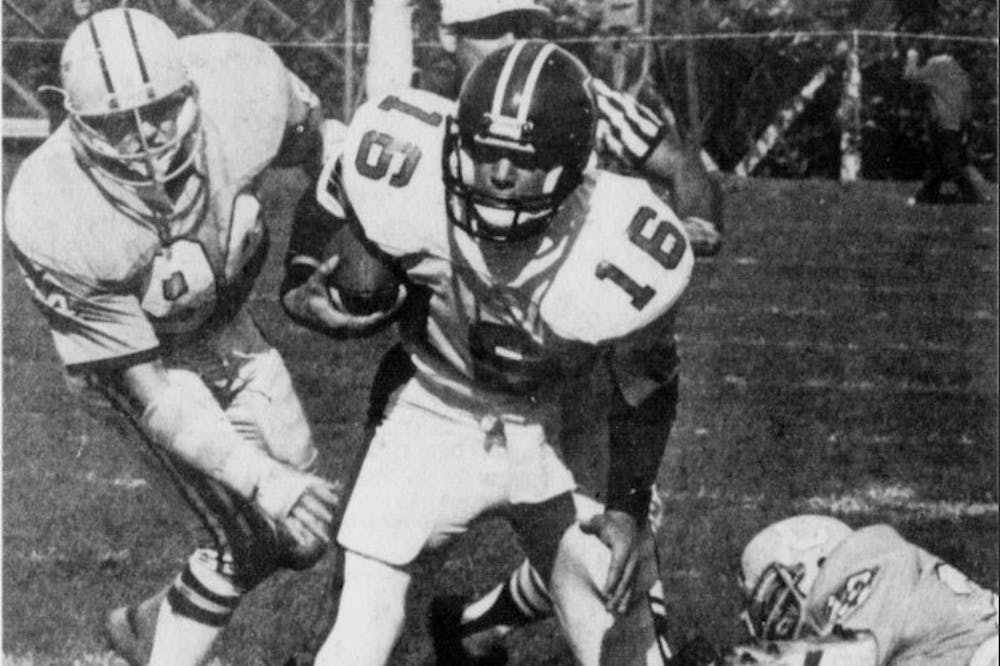This story is part of a series on Penn football's 18 Ivy League titles. Click here to read about the team's 1959 championship.
Demoted they were, but dejected they were not.
After over 100 years of competing in the top-level Division I-A — now known as the Football Bowl Subdivision — and its predecessors, Penn and the rest of the Ivy League had been downgraded to Division I-AA — now known as Football Championship Subdivision — before the 1982 season, meaning that it would no longer have access to top bowl games.
To add insult to injury, before the start of the season, Penthouse picked Penn as one of the 20 worst college football teams in the entire country.
To avoid distractions, the team spent a week training in Pocono Mountains to focus on football and bond as a group.
"We felt that we needed to get our team away and mold them a little bit," said coach Jerry Berndt, who is now retired. "It was a week of learning and growing together."
Prior to its membership in the Ancient Eight, Penn brought home seven national titles, and since becoming an Ivy League team, Penn has accumulated 18 conference titles. While each of those championships has a unique story, the Quakers' 1982 title was particularly significant, as it was the team's second Ivy crown and first since 1959.
After stints at two different high schools and two different colleges, Berndt was entering his second season as the coach of the Quakers. He tempered many expectations in his first season, finishing with a dismal 1-9 record that put his team dead last in the Ivy League.
But the next year, everything would change.
On paper, Penn’s 1982 season does not look like that of a conference champion. At season’s end, the team had three losses. The Quakers’ season also ended with a 23-0 shutout at the hands of Ivy rival Cornell. So how did a team that finished its season on a disappointing loss to a conference opponent still manage to claim a share of the season’s conference title?
In 1982, the Quakers wasted no time establishing the fact that they were a talented team with a real shot at an Ivy title. The Quakers began the season with a commanding 21-0 shutout victory over Ivy foe Dartmouth. After narrowly defeating non-conference opponent Lehigh the following week, the Quakers proceeded to topple Columbia and Brown, giving them a 3-0 start in the Ivy League, and a 4-0 record overall.
After their early successes, the Quakers hit their first bump in the 1982 season when a trip to play Lafayette resulted in a two-score defeat. Despite being able to bounce back the following week with a win over Yale, the Quakers tallied their second loss in three weeks during a road trip to play Princeton.
Following their contest with Princeton, Penn had only three games remaining in the short 10-game Ivy football season. After a hot start to a 4-0 record, Penn had gone 1-2 in the middle of their season, slightly dampening its Ivy title hopes. Luckily for the Quakers, two of these final three games were at Franklin Field, and the team was undefeated in their home contests so far this season.
After knocking off No. 12 Colgate, Penn prepared for its most critical matchup yet.
In front of a crowd of 34,746, the Quakers faced off against Harvard. After dominating for the first three quarters, running back Steve Flacco — the father of Super Bowl XLVII MVP Joe — found the end zone to give Penn a commanding 20-0 lead.
However, soon after, the Quakers tailed the Crimson by a single point with just three seconds left on the clock. But the Quakers were driving and in field goal range.
Starting quarterback Gary Vura received the snap and held the ball for kicker Dave Shulman to put through the uprights. But with winds as strong as 21 mph, the kick sailed wide left.
The Quakers received a saving grace when referee Bob Lynch called a roughing the kicker penalty on the Crimson. This time, Shulman didn't miss, and Penn came away with the 23-21 victory.
"It was just complete euphoria," Shulman told The Daily Pennsylvanian five years later. "It was the greatest moment of my life. I was in la-la land."
Entering the final game in their season, the Quakers were 7-2 (5-1 Ivy). Their chances at a share of the Ivy title or even an outright victory seemed very real, and the team only had one last hurdle: a road trip to Ithaca, N.Y. to face rival Cornell. However, this contest was a blowout loss for the Red and Blue, and it was not the way the team hoped to end its special season.
In spite of their late season defeat at the hands of the Big Red, the Quakers’ 5-2 record in the Ivy League was enough to tie for the best conference record alongside Harvard and Dartmouth.
The 1982 football season served as a re-emergence of the Quakers as a legitimate threat in the Ivy League. After a 23-year drought in the conference, the team claimed its first of four titles under Berndt. Nearly 40 years since this storied team took the field, its impact is still being felt, as the teams helped to transform Penn football into a perennial Ivy contender.









